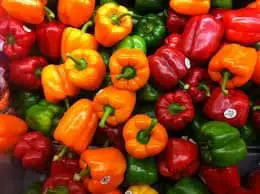The trick to getting bigger bell peppers and more of them is the same as it is with any plant: the healthier the plant, the healthier the harvest. Learning the ideal conditions for growing bell peppers is the very first step in improving your pepper crop.
What bell peppers like:
-Warm temperature and soil. Studies have shown increasing the soil temperature bell peppers are planted in will increase their yield and the overall health of the plant. In areas where temperatures are not already high, outdoor bell peppers may need an in-ground heater to produce large fruit.
-High humidity. Bell peppers love humidity. Hot and dry conditions can not only decrease pepper size, but may even kill the plant. You can increase humidity by misting and planting humidity increasing companion plants as well as ground covers to help the soil stay moist.
-Well-drained soil. While bell peppers do enjoy humidity, they don’t enjoy being over watered. They are also prone to root rot. Be sure your soil drains well (clay is not recommended) or if you are container gardening provide ample drainage.
-Space to stretch. Peppers will grow in close quarters with other plants, but overcrowding can lead to smaller peppers. Make sure any companion plants don’t prevent sunlight from your peppers and that there is enough room for roots. Peppers also don’t like to be alone as they can be fragile to the elements. Around a foot between each plant is considered ideal to block wind, but give each plant its space.
-Slightly Alkaline pH. pH can have a dramatic affect on fruit size and number. Bell peppers dislike acidic soil preferring a pH of around 6-7.
How to maintain bell pepper plants for optimal health:
-Prevent Pests. Any type of pest or disease in plants will affect health and in turn yield and pepper size. Check your plants regularly for infections. As bell peppers are food plants, organic pest control is recommended. Several companion plants will deter most pests such as marigolds.
-Pinch early flowers. Sometimes bell peppers will attempt to make peppers before maturity. If you catch your bell peppers trying to jump the gun, pinch the flowers before fruitation and your later harvests will be healthier.
-Fertilize only when first planting and after harvesting. Fertilizing between harvests will promote foliage growth rather than fruit production taking valuable energy from the pepper making task.
If you are interested in growing bell peppers, you may also enjoy:
Companion Plants for Bell Peppers

